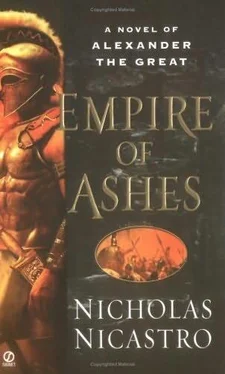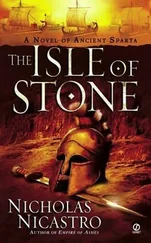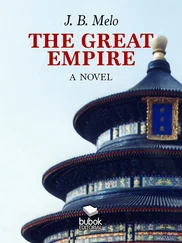Nicholas Nicastro - Empire of Ashes - A Novel of Alexander the Great
Здесь есть возможность читать онлайн «Nicholas Nicastro - Empire of Ashes - A Novel of Alexander the Great» весь текст электронной книги совершенно бесплатно (целиком полную версию без сокращений). В некоторых случаях можно слушать аудио, скачать через торрент в формате fb2 и присутствует краткое содержание. Жанр: Исторические приключения, на английском языке. Описание произведения, (предисловие) а так же отзывы посетителей доступны на портале библиотеки ЛибКат.
- Название:Empire of Ashes: A Novel of Alexander the Great
- Автор:
- Жанр:
- Год:неизвестен
- ISBN:нет данных
- Рейтинг книги:4 / 5. Голосов: 1
-
Избранное:Добавить в избранное
- Отзывы:
-
Ваша оценка:
- 80
- 1
- 2
- 3
- 4
- 5
Empire of Ashes: A Novel of Alexander the Great: краткое содержание, описание и аннотация
Предлагаем к чтению аннотацию, описание, краткое содержание или предисловие (зависит от того, что написал сам автор книги «Empire of Ashes: A Novel of Alexander the Great»). Если вы не нашли необходимую информацию о книге — напишите в комментариях, мы постараемся отыскать её.
Empire of Ashes: A Novel of Alexander the Great — читать онлайн бесплатно полную книгу (весь текст) целиком
Ниже представлен текст книги, разбитый по страницам. Система сохранения места последней прочитанной страницы, позволяет с удобством читать онлайн бесплатно книгу «Empire of Ashes: A Novel of Alexander the Great», без необходимости каждый раз заново искать на чём Вы остановились. Поставьте закладку, и сможете в любой момент перейти на страницу, на которой закончили чтение.
Интервал:
Закладка:
“If your employer takes himself for a man, he will take exception to what I say. If so, let him not flee from me, but stand and fight. Rest assured that I will give him every advantage. And if the day is his, he can expect that his enemy will not run, but welcome whatever fate the victor should decree. But until that day, let him know that the Lord of Asia considers him little more than a criminal, and will pursue him to the ends of the earth until the day he appears where his servant does now, on bended knee, and begs my pardon. Now off with you!”
Soon enough, we learned the Great King’s answer to these insults.
That night Alexander received reports from scouts sent to find Darius. They found neither the enemy nor significant resistance, but did learn that an urgent call had gone out to every corner of the empire for all native levies to gather near Babylon. Rumors held that Darius blamed his defeat at Issus not on Alexander’s leadership, but on the tight topography, which restricted the movement of the superior Persian cavalry. Alexander smiled at this conceit, but must have burned inwardly; as you will hear, his desire to leave Darius no excuse for his defeat had more effect on his tactics at Gaugamela than any military consideration.
The Macedonians crossed the Tigris without the loss of a single man. After the army made camp on the easterly shore, two significant events occurred. First, there was a total eclipse of the moon, which appeared high in the sky at the change of the midnight watch. The Macedonians were not so much frightened by the apparition as uneasy about its meaning on the eve of such an important battle. Aristander interpreted the eclipse as evidence that a great contest was underway in Heaven, with the moon allied for Darius and earth for Alexander. The spectacle portended the final victory of the Macedonians.
The second event was the eclipse of Stateira, Darius’s wife. Despite Parmenion’s advice that the Great King’s family should have been left in Sidon or Damascus, Alexander had kept Sisygambus, Stateira and the rest close to him. For him, it was nothing less than a guarantee of his honor as inheritor of the Achaemenid royal house. Despite his protection, however, the Queen was somehow gotten with child, and was far along in her pregnancy. Of the circumstances of her violation I know nothing but the fact of it-I saw her expectant form myself one evening, in silhouette against the fabric of her tent. When she fell ill she sank quickly, despite the best efforts of the king’s personal doctor, Philip. Alexander grieved at her death, decreeing that her funeral be conducted in true Persian fashion.
I witnessed these curious rites. The body was placed under a white shroud and left exposed for three days beside lamps filled with aromatic oil. Instead of cremating her body in civilized fashion, the barbarians prepared a deep grave to house her bones. Believing that deities somehow care for the moral conduct of human beings, the priests of Zoroaster kept up a long series of chants in their native tongue, enjoining their gods to give the dead entrance to their heavenly paradise.
As dogs are sacred to the Persians, packs of yowling mutts kept up a constant din. They came off the leash for a particularly odd custom: the priest broke a loaf of bread into three parts, and placed the pieces on the body at the breast, stomach, and hipbone. Then a dog was invited to climb up on the bier and devour the bread. If this makes any sense at all, it is perhaps rooted in our myth of Kerberos, or in the purificatory use of dead dogs by fools and old women, though these rites seem much distorted in the minds of the barbarians.
Alexander, remarkably, took part in these honors, donning the white funeral garb and mouthing some of the prayers in the Persian tongue. Instead of distributing portions of the sacrificed animals, he forbade the consumption of any meat in the Macedonian camp. These embarrassing extremities led some to speculate that Alexander bore some tender feeling for the dead Queen. None would have denied his right to avail himself of her. Yet in the letter he sent to Darius informing the latter of his wife’s death, the King denied any such relationship. To my knowledge, no one has attested to any contact between him and the Queen since their first meeting. Those of good will assume that Alexander’s observance of the Persian rite was meant to discourage resistance to his rule. Those of ill-will may believe what they wish.
On a plain east of the Tigris, not far from the little town of Gaugamela, Darius gathered the force that would decide his future. We’ve all heard of the host Xerxes brought to humble Greece in the time of Pericles-his army numbered five million men, claims Herodotus. But the number we use to ennoble ourselves in the eyes of our children need not deceive us now. Xerxes brought no more than 400,000 soldiers with him into Greece, and fewer than that were at last defeated by the allied cities at Plataea. Aeschines’ claim that Darius brought a million or a half-million men to his last battle is likewise a fiction.
From every corner of the Persian Empire, arranged all around the upraised standard of the Great King, stood a many-colored host numbering some 250,000 men. I assure you that from where we stood, this seemed plenty. Looking out across the ground Darius had smoothed for the contest, we were confronted with a force that loomed like a mountain range and stretched to the horizon. There were Median spearmen in their belted tunics and trousers, waiting with daggers at their thighs and spears resting on their front feet. There were Scythian axmen in their pointed headgear, and Bactrian, Parthian and Massagetan cavalries that outnumbered the Macedonian levies five to one. There were Persian, Carian and Mardian bowmen, and Lycians in their crested felt caps, and foot soldiers and chariots of the Assyrian, Babylonian, and Susian satrapies, and contingents of Syrians, Albanians, Cappadocians, Machelonians, Armenians, Daae, Hyrcanians, Uxians and Sarangae with their knee-high boots, and Mycians, Utians, Paricanians, Chorasmians and Cissians in turbans, and Arachotians, Cadusians, Arians, Gandarans, Sacesinians, Gedrosians, Sogdians, Colchians, Sitacenians, and leopard-skinned Ethiopians and Arabs. There were 200 scythed chariots, and fifteen war elephants with their breech-clothed mahouts. And, of course, there were seasoned Greek mercenaries, all eager to avenge the deaths of their comrades at Issus and the Granicus, and in some cases at Chaeronea too.
Some of the enemy, such as the so-called “Apple Bearer” battalion of Immortals who defended Darius, were clad in fine plate armor; others arrived at the field with wicker shields, or naked, or bearing only clubs. There was no chance for fancy strategy against such a motley force-the Macedonians had no idea how these barbarians would fight. Instead, Alexander made good on his promise to Aegoscephalus and simply offered battle, with a double phalanx of Foot Companions in the center, Parmenion and the Thessalian cavalry on the left, and his Hypaspists and Cavalry Companions beside him on the right. He deployed the rest of his cavalry with their lines swept back, to resist envelopment.
To say that the Macedonians confronted the day’s task with utter confidence would be a lie. With such overwhelming advantage in numbers, Darius did not need to prevail in the first clash, or even the second, third, or fourth. He needed only to hold his army together long enough to grind the Macedonians down, then crush them with wave upon wave of fresh reserves. This was not a plan that required subtle generalship.
Standing the ranks with the other hypaspists, I could sense an unease that had not been there at Issus; many of those men expected to be dead by the afternoon. When I saw Alexander early that morning, there was no trace of the arrogance that marked his treatment of Darius’s envoy. Instead, he was almost deliriously chipper, as if he would finally get his wish that day, and permanently avoid the assassin’s knife. I also noticed that he did not risk besmirching Achilles’s armor by wearing it at his likely defeat.
Читать дальшеИнтервал:
Закладка:
Похожие книги на «Empire of Ashes: A Novel of Alexander the Great»
Представляем Вашему вниманию похожие книги на «Empire of Ashes: A Novel of Alexander the Great» списком для выбора. Мы отобрали схожую по названию и смыслу литературу в надежде предоставить читателям больше вариантов отыскать новые, интересные, ещё непрочитанные произведения.
Обсуждение, отзывы о книге «Empire of Ashes: A Novel of Alexander the Great» и просто собственные мнения читателей. Оставьте ваши комментарии, напишите, что Вы думаете о произведении, его смысле или главных героях. Укажите что конкретно понравилось, а что нет, и почему Вы так считаете.












